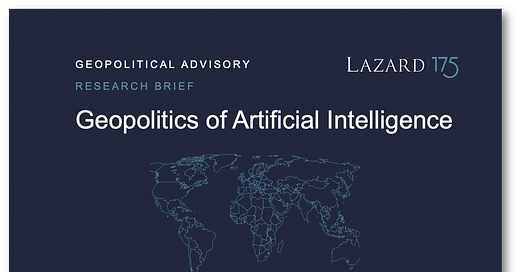The geopolitics of artificial intelligence or "why the world is not singing Kumbaya over AI"
The world is already “bifurcating” into US or China AI zones
👉TAKEAWAYS:
🔹 AI is pivotal to the unfolding, and end state, of US-China competition:
The compounding economic and national security benefits of leadership in AI will arguably have a determinative impact on the outcomes of US-China rivalry
🔹 Geopolitical bottlenecks in the AI supply chain currently favor the US but its leadership in AI is not predetermined:
The US’ structural advantages in computing power, talent, and energy bolster Washington’s ability to gatekeep AI development and apply geopolitical pressure to competitors.
🔹 Distinct commercial and regulatory AI ecosystems will emerge:
As the US and China solidify their leads and tighten control over necessary inputs, countries have reluctantly started to align with the US or China to ensure access to increasingly indispensable AI.
🔹 Middle / great powers (i.e., Canada, France, Israel, the UK) can leverage AI to punch above their weight:
Advanced economies with strong education and innovation ecosystems can compensate for declining geopolitical influence by leveraging AI.
🔹 Less developed countries will fall behind in the current race for AI:
Less developed countries will increasingly need to trade market access in exchange for access to powerful AI.
🔹 New international governance frameworks on the horizon:
Proposals for new agencies and models of governance are proliferating.
The world is already “bifurcating” into AI zones separated by the US or China’s big tech influence
👊STRAIGHT TALK👊
AI, whether it likes it or not, is squarely in the middle of the great geopolitical game, so why do so many ignore it?
It seems not a day goes by without a new paper proclaiming the transformational power of AI and calling for cooperation on global regulation to keep its vices in check.
These calls for international AI regulation seem to ignore the grim geopolitical reality on the ground for AI cooperation.
But what makes this interesting is that this isn’t just a US and China problem. Take the EU, for example, where the new AI Act is already poised to bring lawsuits against the US’s big tech companies, which have tried unsuccessfully to get the regulations watered down.
Other nations have opinions on how best to regulate AI that will make international agreements at best tricky. At worst, we will see another tech bifurcation, just as we saw over Huawei 5G systems.
So, bringing this back to fintech, imagine if you will, a bank that launches an AI system with global reach. Can you imagine the regulatory mess? Worse, what if it captures client data in a nation that favors China-style strict personal data protection laws?
Someone in a bank compliance department has to be losing sleep over this!








